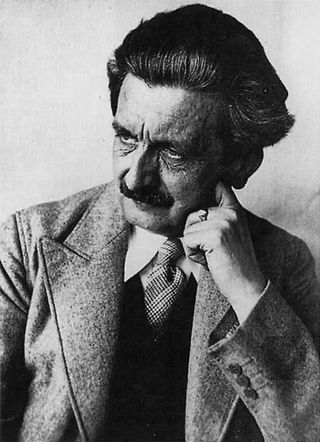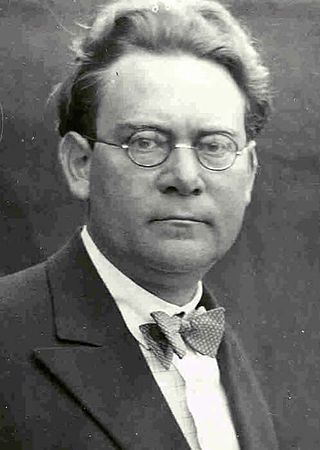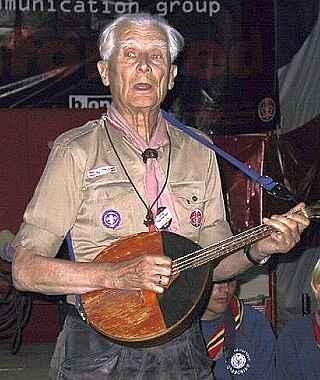Related Research Articles

Jaroslav Foglar was a Czechoslovak writer who wrote many novels about youths and their adventures in nature and dark city streets. His signature series is Rychlé šípy, which was adapted into comics by Jan Fischer.

Gustav Adolf Franz Brand was a German writer, egoist anarchist, and pioneering campaigner for the acceptance of male bisexuality and homosexuality.

Wandervogel is the name adopted by a popular movement of German youth groups from 1896 to 1933, who protested against industrialization by going to hike in the country and commune with nature in the woods. Drawing influence from medieval wandering scholars, their ethos was to revive old Teutonic values, with a strong emphasis on German nationalism. According to historians, a major contribution of the Wandervögel was the revival of folk songs in wider German society.

Hans Reichenbach was a leading philosopher of science, educator, and proponent of logical empiricism. He was influential in the areas of science, education, and of logical empiricism. He founded the Gesellschaft für empirische Philosophie in Berlin in 1928, also known as the "Berlin Circle". Carl Gustav Hempel, Richard von Mises, David Hilbert and Kurt Grelling all became members of the Berlin Circle.
The German Youth Movement is a collective term for a cultural and educational movement that started in 1896. It consists of numerous associations of young people that focus on outdoor activities. The movement included German Scouting and the Wandervogel. By 1938, 8 million children had joined associations that identified with the movement.

The Scout movement in Germany consists of about 150 different associations and federations with about 260,000 Scouts and Guides.

The Young German Order was a large paramilitary and national liberal organisation in Weimar Germany. Its name and symbol were inspired by the Teutonic Knights.

Eberhard Koebel also Eberhard Köbel, called tusk, i.e., "the German" in the language of the Sámi people he traveled among, was a German youth leader, writer, and publisher.

Freda Meissner-Blau was an Austrian politician, activist, and prominent figurehead in the Austrian environmental movement. She was a founder and the federal spokesperson of the Austrian Green Party.
Wilhelm Hans "Willie" Jahn was a German track and field athlete who competed in the 1912 Summer Olympics.

The Sturmtrupp-Pfadfinder was a Scout association in Germany active from 1926 to 1934. The association never had more than 500 members. It was the first Scout association in Germany to admit boys and girls. It was interdenominational and politically neutral.
Ludwigstein Castle is a 15th-century castle overlooking the river Werra and surrounded by woodland. It stands southwest of the town of Witzenhausen in North Hesse. Founded in 1415 the castle's buildings today were built in the 16th and 20th centuries. It was allowed to go to ruin in the late 19th century.

Jakob Wilhelm Hauer was a German Indologist and religious studies writer. He was the founder of the German Faith Movement.

Hans Blüher was a German writer and philosopher. He attained prominence as an early member and "first historian" of the Wandervogel movement. He was aided by his taboo breaking rebellion against schools and the Church. He was received with some genuine interest but sometimes perceived as scandalous.
Naturism is a cultural and social movement practicing, advocating and defending social nudity in private and in public. It is particularly strong in Germany where it goes under the name Freikörperkultur (FKK). It refers to a lifestyle based on personal, family and/or social nudism in the "great outdoors" environment. Naturism grew out of the German Lebensreform movement and the Wandervogel youth movement of 1896, and has been adopted in many neighbouring European countries and was taken by the German diaspora to North America and other continents.

Alexej "Axi" Stachowitsch was an Austrian-Russian author, pedagogue, songwriter, technician, one of the most important figures of post-war Scouting and Wandervogel in Germany and Austria, and founder and first principal of the Werkschulheim Felbertal. Stachowitsch was a program director and journalist at the 7th World Scout Jamboree in Bad Ischl, director of the de:Nerother Wandervogel, co-founder of the independent Balduinstein educational institution and founder of the Jungenbundes Phoenix. Meanwhile, it has become known that the castle Balduinstein has been the site of many acts of sexual violence against male minors since its founding and for three decades.

A Jugendburg, sometimes referred to in English as a youth castle, is a mediaeval castle in German-speaking countries that was converted during the 20th century into a public community centre or educational facility for young people. The sponsors of the original youth castles came mainly from the Wandervogel and Pfadfinder movement, or were at least linked to the youth movement.
Alexander Schwab was a German political activist. He withdrew from active participation in politics after resigning from the fractious and short-lived Communist Workers' Party in 1922, but continued his contribution as an independent left of centre commentator-journalist. During the twelve Nazi years he was arrested at least twice, spending the final years of his life, between 1936 and 1943, in a succession of jails. Sources may also identify him by the pseudonym under which some of his contributions were published, as Albert Sigrist Sachs.
Anna Klara Fischer was a German political activist. The focus of her activism was on social policy in general and, more specifically, on the avoidance of drunkness and the impoverishment of wives and children that it caused. She also became actively engaged in various issues touching on women's rights.
References
- ↑ Williams, John Alexander (2001). "Ecstasies of the Young: Sexuality, the Youth Movement, and Moral Panic in Germany on the Eve of the First World War". Central European History. 34 (2): 163–189. doi:10.1163/15691610152977938. ISSN 0008-9389. JSTOR 4547061. PMID 18335631. S2CID 33555901.
- ↑ Warfield, L. "There is Nothing in the World But Youth: the Ambiguous Legacy of the Wandervögel". The Secret Beach. Retrieved 28 February 2021.
- ↑ Reichenbach, Marie (1978). "Student years: Introductory Note to Part 1". Hans Reichenbach: Selected Writings, 1909-1953. I.